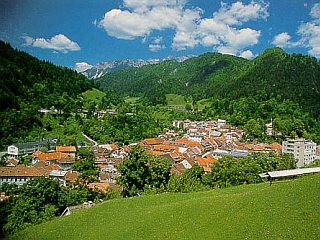
For decades, the Borns were among the most influential families in Slovenia. In the political turmoil of the 20th century, they ended up losing almost everything, only to get a second chance with the advent of democracy.
In the 1880s, Julius Born, a Berlin-based financier, was already familiar with the Slovenian countryside -- he frequently hunted in the vast forests under the Alps. One day, he received a request that was to change his life: He was asked to move to the town of Tržič in order to help bail out the struggling Carniolan Industrial Company, one of the largest corporations in what is now Slovenia.
Born not only managed to save the company, but he also ended up purchasing a large share of its extensive landholdings. He ultimately became the owner almost a third of all woodlands around Tržič.
As a landholder, Born was a progressive figure. He took good care of his employees and was well-liked in return. His stewardship of the land was far ahead of its time. Even though he routinely invited Europe’s leading industrialists to hunt in his forests, he took great care to avoid overhunting, and he even reintroduced the Alpine ibex to the Slovenia woods.
In a narrow valley above Tržič, known as Jelendol (or Puterhof at the time), Born built a prosperous country estate, centered on an opulent mansion. He constructed a hydroelectric plant in the valley, as well as a modern road that opened up the formerly inaccessible valley. Later, he helped the Austro-Hungarian authorities with the construction of the Southern Railway, which connected Vienna with the port city of Trieste. For his assistance, he was given the title of Baron.
Julius Born died in 1897 during a business trip to the United Kingdom. Because his three children -- Friderik, Elfrida, and Karl – were not yet of age, the management of the Born estate temporarily passed to legal guardians, and the estate quickly found itself in financial difficulties. The situation only improved after Julius’ children finally took over the estate themselves.
The Born children continued the work that their father had started, and they soon constructed a wood processing facility in Jelendol. Eventually, Karl ended up buying most of the property from his siblings, and built a railroad that greatly speeded up the transport of wood into the valley.
World War II changed everything. The occupying Nazis, who discovered that the Borns were partly of Jewish descent, confiscated their property. Friderik was sent to a concentration camp because of his anti-Nazi views and lost his life there. Meanwhile, Partisan guerillas destroyed much of the Jelendol estate. Karl survived the war, but the post-war Communist government in Yugoslavia was almost as hostile as the Nazis had been, and it permanently nationalized the family’s holdings. Exiled to Vienna, Karl Born died in 1957. The Jelendol mansion was turned into low-income housing.
With the advent of democracy and Slovenia’s independence, however, fortunes once again changed for the Born descendants. As part of Slovenia’s denationalization program, the forests originally purchased by Julius Born were returned to the surviving members of the Born family -- Karl Born’s daughters. Even though one of them lives in the U.S. and the other in South Tyrol, they now frequently visit their property and are even encouraging their children to learn the Slovenian language. The Born family may once again become one of the leading names in the Tržič area, well over a century after Julius Born was summoned there to save a struggling company.

































































